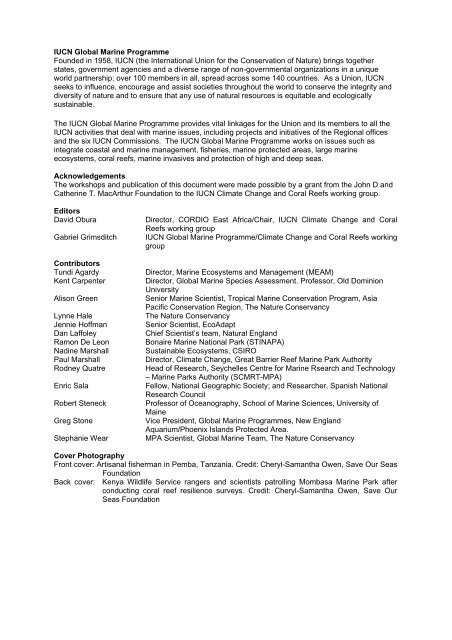Obura2009-IUCN Congress report - Resilience sessions
Obura2009-IUCN Congress report - Resilience sessions.pdf
Obura2009-IUCN Congress report - Resilience sessions.pdf
Create successful ePaper yourself
Turn your PDF publications into a flip-book with our unique Google optimized e-Paper software.
<strong>IUCN</strong> Global Marine Programme<br />
Founded in 1958, <strong>IUCN</strong> (the International Union for the Conservation of Nature) brings together<br />
states, government agencies and a diverse range of non-governmental organizations in a unique<br />
world partnership: over 100 members in all, spread across some 140 countries. As a Union, <strong>IUCN</strong><br />
seeks to influence, encourage and assist societies throughout the world to conserve the integrity and<br />
diversity of nature and to ensure that any use of natural resources is equitable and ecologically<br />
sustainable.<br />
The <strong>IUCN</strong> Global Marine Programme provides vital linkages for the Union and its members to all the<br />
<strong>IUCN</strong> activities that deal with marine issues, including projects and initiatives of the Regional offices<br />
and the six <strong>IUCN</strong> Commissions. The <strong>IUCN</strong> Global Marine Programme works on issues such as<br />
integrate coastal and marine management, fisheries, marine protected areas, large marine<br />
ecosystems, coral reefs, marine invasives and protection of high and deep seas.<br />
Acknowledgements<br />
The workshops and publication of this document were made possible by a grant from the John D and<br />
Catherine T. MacArthur Foundation to the <strong>IUCN</strong> Climate Change and Coral Reefs working group.<br />
Editors<br />
David Obura<br />
Gabriel Grimsditch<br />
Contributors<br />
Tundi Agardy<br />
Kent Carpenter<br />
Alison Green<br />
Lynne Hale<br />
Jennie Hoffman<br />
Dan Laffoley<br />
Ramon De Leon<br />
Nadine Marshall<br />
Paul Marshall<br />
Rodney Quatre<br />
Enric Sala<br />
Robert Steneck<br />
Greg Stone<br />
Stephanie Wear<br />
Director, CORDIO East Africa/Chair, <strong>IUCN</strong> Climate Change and Coral<br />
Reefs working group<br />
<strong>IUCN</strong> Global Marine Programme/Climate Change and Coral Reefs working<br />
group<br />
Director, Marine Ecosystems and Management (MEAM)<br />
Director, Global Marine Species Assessment. Professor, Old Dominion<br />
University<br />
Senior Marine Scientist, Tropical Marine Conservation Program, Asia<br />
Pacific Conservation Region, The Nature Conservancy<br />
The Nature Conservancy<br />
Senior Scientist, EcoAdapt<br />
Chief Scientist’s team, Natural England<br />
Bonaire Marine National Park (STINAPA)<br />
Sustainable Ecosystems, CSIRO<br />
Director, Climate Change, Great Barrier Reef Marine Park Authority<br />
Head of Research, Seychelles Centre for Marine Rsearch and Technology<br />
– Marine Parks Authority (SCMRT-MPA)<br />
Fellow, National Geographic Society; and Researcher, Spanish National<br />
Research Council<br />
Professor of Oceanography, School of Marine Sciences, University of<br />
Maine<br />
Vice President, Global Marine Programmes, New England<br />
Aquarium/Phoenix Islands Protected Area.<br />
MPA Scientist, Global Marine Team, The Nature Conservancy<br />
Cover Photography<br />
Front cover: Artisanal fisherman in Pemba, Tanzania. Credit: Cheryl-Samantha Owen, Save Our Seas<br />
Foundation<br />
Back cover: Kenya Wildlife Service rangers and scientists patrolling Mombasa Marine Park after<br />
conducting coral reef resilience surveys. Credit: Cheryl-Samantha Owen, Save Our<br />
Seas Foundation


















